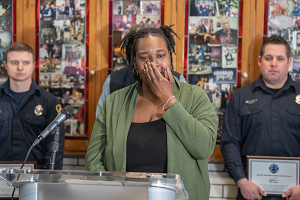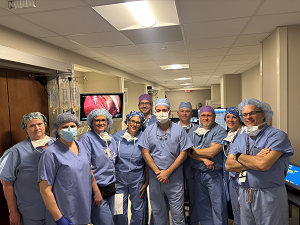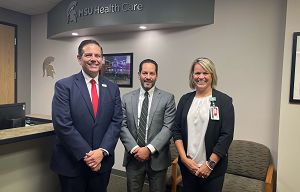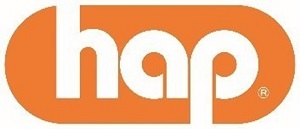Henry Ford Healthcare Workers Share Personal, Moving Reflections of the Pandemic

DETROIT (April 22, 2021) – Three Henry Ford Health System healthcare workers shared incredibly personal and moving stories of their experience navigating the ups and downs of the rolling pandemic, quarantining from family and friends and losing patients and family members to COVID-19.
Lauren Varley, a Registered Nurse in the Medical Intensive Care Unit (MICU) at Henry Ford Hospital in Detroit and Dominique Gjokaj, a Registered Nurse in the MICU at Henry Ford Macomb Hospital in Clinton Township, spoke of the uncertainty when the virus first hit in March 2020 and feeling like unseasoned nurses caring for patients who were hospitalized when little was known of how to treat COVID-19. They talked of caring for patients in their 20s, 30s and 40s – “way too young” to be facing the reality of the virus’ devastation.
Marion King spoke in heart-wrenching detail of losing her mom and aunt to COVID-19 just days apart last month, and how that tragic loss spurred her to get vaccinated and became a strong advocate for vaccination.
Their remarks came during a news media briefing Thursday at which Henry Ford senior leaders reported emerging signs that hospitalizations are beginning to plateau, and they hope to see “slow declines” in the next two weeks.
“While we are encouraged by these positive signs,” said Bob Riney, President of Healthcare Operations and Chief Operating Officer, “it’s really important that our community continue to stick with us and rally behind our healthcare workers . . . and how important it is for the community to help us win against this virus and provide stability for our healthcare workers.”
Varley, who has worked in the MICU at Henry Ford Hospital since 2015, described the onset of the first surge of cases as “traumatic” and remembered the call she made to her parents to inform them that she wouldn’t be able to see them for concern for their safety.
“We didn’t know what we were walking into and it was the first time that I, and my parents don’t even know this,” she recalled, her voice cracking with emotion, “I created a COVID action plan for myself in the event that I myself got sick. I was OK with that, but I wasn’t OK if my parents got sick or if they got sick from me. That was something I struggled with a lot.”
For six months she stayed in touch with her parents and family through Zoom and Facetime conversations. “It was the price I was willing to pay so they stayed alive and they stayed healthy,” she said.
Varley said the patients lost in the early days of the pandemic left her feeling hopeless and helpless as a nurse.
“Because I knew that any patient I saw with COVID, I knew there was a high possibility they were not going to survive. And it was difficult to try and talk to their family members. I was having a difficult time processing those emotions, and it started to lead me to feeling angry and feeling very frustrated. Not only at the situation, but at myself because I couldn’t understand why as a nurse, it wasn’t working initially. Everything that we were doing wasn’t working. It was a very difficult thing to admit to myself.”
Gjokaj was just getting acclimated working in the MICU at Henry Ford Macomb Hospital when the pandemic hit. A team member at the hospital for 6 ½ years, she joined the MICU in the spring of 2019.
“We were just starting to get COVID patients and it was like everybody was a new nurse at that point,” she said. “Nobody knew what we were dealing with or where to go with everything. We all had to work with each other, which I think showed how strong we were as a unit.”
Gjokaj said her experience taught her the importance of being able to adapt to evolving situations in the MICU. And that each COVID patient that presented was different than the next. She talked of otherwise healthy patients suddenly having trouble breathing.
“I feel lucky with the people that I work with because they were so supportive,” she said. “Now we have different treatment plans and we’re a little bit stronger with how we’re handling things. And so the dark veil that happened last year during this time is kind of starting to lift. With all the vaccinations, the enforcing of the masks and having people social distance, it’s taking time, but I feel like we’re hopefully getting to a little bit of a silver lining.”
King, a licensed practical nurse, came to work at Henry Ford’s mass vaccination site at One Ford Place in Detroit, just days after losing her 66-year-old mom and 65-year-old aunt to COVID. It was that tragic loss that moved her to get vaccinated herself and became a vaccinator.
She vaccinates as many as 100 people a day and sees a range of emotions from those who come to her vaccination station. She has convinced dozens of family members, friends and neighbors to trust the vaccine. “Let’s stop being selfish,” said King, who was initially hesitant to get vaccinated and declined to receive the Moderna vaccine three times, “and to help those who want to help others. By helping the cause to get vaccinated . . . we can help you all.”
That sentiment was echoed by Gjokaj and Varley.
“If you’re uncomfortable with the vaccine, do your research. See what the medical professionals are saying,” Gjokaj said. “It’s important to get your vaccine, it’s important to mask up and it’s important to social distance.”
“My biggest take-home message to the community is to please help us by helping you,” Varley said. “Getting vaccinated would be a positive step in the right direction. So, we can keep moving forward, not moving backward.”
In other news discussed at the briefing, Adnan Munkarah, M.D., Executive Vice President and Chief Clinical Officer, reported on a significant increase in administrations of the monoclonal antibody therapy in the first week since Henry Ford announced it was expanding access to the promising treatment.
“In the first week after expanding access to monoclonal antibody therapy,” Dr. Munkarah said, “we administered a total of 192 infusions (an increase of 47 infusions over the previous week) at our new sites which include Henry Ford Hospital, Henry Ford Macomb Hospital as well as our existing sites at two outpatient medical centers in Dearborn and Novi and Henry Ford Allegiance Health. We are currently in the 2nd week and we project a total of 250 infusions as we expand our outreach program.”
Dr. Munkarah said during the first five weeks of the third surge, the number of infusions administered has increased four-fold – from 37 a week to 145 a week. He commended the leadership of Diane George, D.O., Chief Medical Officer for Primary Care, Bruce Muma, M.D., CEO of the Henry Ford Physician Network, and Jane Thornhill, Vice President of Business Operations of the HFPN, as well as other members of their team for creating an efficient and effective patient care process.
On the health system’s vaccination progress, Dr. Munkarah said more than 267,000 doses of vaccine have been administered since Dec. 17 and more than 152,000 people have been vaccinated. Not only are the vaccines safe and effective, he said, they protect you from getting sick and becoming severely ill.
“You have a 25-fold less risk of being infected with COVID if you get vaccinated compared to those who don’t get vaccinated,” Dr. Munkarah said.
###
NEWS MEDIA ONLY may contact: David Olejarz / David.Olejarz@hfhs.org / 313-303-0606
About Henry Ford Health System
Founded in 1915 by Henry Ford himself, Henry Ford Health System is a non-profit, integrated health system committed to improving people’s lives through excellence in the science and art of healthcare and healing. Henry Ford Health System includes Henry Ford Medical Group, with more than 1,900 physicians and researchers practicing in more than 50 specialties at locations throughout Southeast and Central Michigan. Acute care hospitals include Henry Ford Hospital in Detroit, MI and Henry Ford Allegiance Health in Jackson, MI – both Magnet® hospitals; Henry Ford Macomb Hospital; Henry Ford West Bloomfield Hospital; and Henry Ford Wyandotte Hospital.
The largest of these is Henry Ford Hospital in Detroit, a quaternary care research and teaching hospital and Level 1 Trauma Center recognized for clinical excellence in cardiology, cardiovascular surgery, neurology, neurosurgery, and multi-organ transplants. The health system also provides comprehensive, best-in-class care for cancer at the Brigitte Harris Cancer Pavilion, and orthopedics and sports medicine at the William Clay Ford Center for Athletic Medicine – both in Detroit.
As one of the nation’s leading academic medical centers, Henry Ford Health System annually trains more than 3,000 medical students, residents, and fellows in more than 50 accredited programs, and has trained nearly 40% of the state’s physicians. Our dedication to education and research is supported by nearly $100 million in annual grants from the National Institutes of Health and other public and private foundations.
Henry Ford’s not-for-profit health plan, Health Alliance Plan (HAP), provides health coverage for more than 540,000 people.
Henry Ford Health System employs more than 33,000 people, including more than 1,600 physicians, more than 6,600 nurses and 5,000 allied health professionals.
###
.svg?iar=0&hash=F6049510E33E4E6D8196C26CCC0A64A4)

/hfh-logo-main--white.svg?iar=0&hash=ED491CBFADFB7670FAE94559C98D7798)








